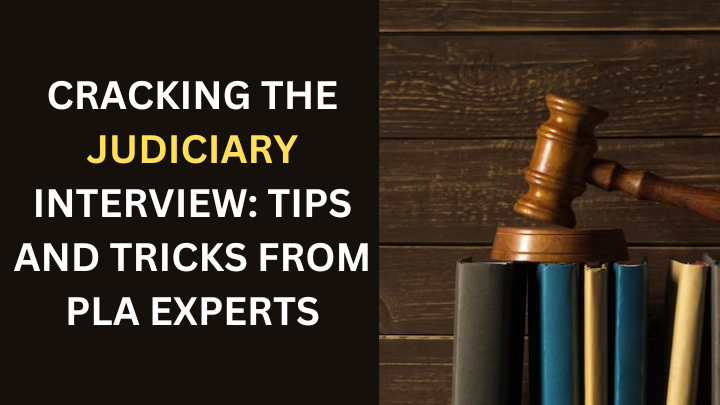Cracking an interview requires a strategic approach and a blend of skills which involves a combination of preparation, confidence, and effective communication. One must not only showcase their qualifications but also demonstrate qualities like adaptability, problem solving and a strong understanding of the role and organization.
“Securing success in a judiciary interview requires a sophisticated approach, blending legal acumen, ethical awareness and effective communication. The aspirants should have a thorough understanding of legal complexities, should be able to demonstrate their judicial temperament and hone their analytical skills for a successful outcome in their pursuit of a judicial position”.
Are you a bit nervous when you enter into the room? It is the most common question feeling which every aspirant feels when an interview type of situation comes into their life. We Pahuja Law Academy prepare the aspirants for the stage-wise preparation of preliminary, mains, and interview. We also have an interview guidance programme which involves grooming sessions and multiple mock interviews involving expert panels with expert judges. The interview is the last stage of the civil judge exam. After the qualifying mains exam interview preparation is started but aspirants find more difficulty in the preparation.
Few tips and tricks mentioned below might help you in preparing for the interview.
1. Legal knowledge: A robust legal knowledge showcases your in-depth understanding of legal principles, statutes and precedents. It reflects your expertise in the field and establishes you as a knowledgeable candidate. Judges often deal with complex legal problems. Legal knowledge equips you with the tools to identify legal issues, analyze facts and propose effective solutions, showcasing your problem-solving skills during the interview. In essence, legal knowledge serves as the bedrock for success in a judiciary interview, allowing you to navigate legal intricacies, exhibit analytical powers, and present yourself as a qualified and capable candidate for a judicial position.
2. Judicial temperament: Judicial temperament emphasizes the ability to remain impartial and fair. Interviewers seek candidates who can set aside personal biases and render decisions objectively this involves maintaining a composed and professional demeanor. Judicial temperament reflects a consistent approach to decision making. Interviewers want to see that you can apply the law consistently and impartially, regardless of personal beliefs or external pressures.
3. Non-verbal communication: It plays a significant role in a judiciary interview and can influence the overall impression you make. Your body language, posture, and overall demeanor contribute to your professional image. Maintaining a poised and confident non-verbal presence conveys a sense of authority and competence. Demonstrating attentive non-verbal behavior such as nodding and maintaining eye contact showcases your ability to actively listen. This is essential for understanding arguments presented during the interview and for being an effective judge. The aspirants should pay attention to these cues as it significantly impacts how interviews perceive your suitability for a judicial role.
4. Current legal landscape: Interviewers often expect candidates to have a contemporary understanding of legal issues. Failing to address current legal developments gives interviewer the expression that you are not actively engaged in the field. Judges are expected to apply the law to current situations and being familiar with the recent statutes, amendments and legal trends allows you to discuss how these changes might impact your decision making as a judge. The legal field is dynamic, and laws evolve over time. In a judiciary interview process, being well versed in the current legal landscape can set you apart from other candidates.
5. Communication skills: Judges need to convey legal concepts in a manner that is easily understood so having good communication skills enable you to articulate your legal reasoning clearly and convincingly during the interview. Judicial interviews often involve scenarios where you must present oral arguments. Effective verbal communication is essential for presenting your viewpoint persuasively, showcasing your ability to advocate judicial decisions. Judges they also have to frequently draft judgements, requiring strong written communication skills. The ability to express legal decisions coherently and logically is crucial for success in the interview and the role itself. Effective communication helps build a positive rapport with the interview panel. Clear and respectful communication enhances your likability and professionalism.
6. Mock interviews: Mock interviews replicates the actual interview experience which allows the aspirants to become familiar with the format, question types and time constraints, thereby reducing anxiety during the real interview. Mock interviews provide an opportunity to practice articulating your thoughts clearly and coherently. This is crucial for conveying complex legal concepts during the actual interview. All-in-all mock interviews are an essential component of interview preparation, it offers a platform for skill development, confidence building and targeted improvement. They contribute significantly to your readiness for the challenges presented in a judiciary interview.
7. Ethical awareness: Ethical awareness is essential for adhering to the professional conduct expected to judges. Aspirants must understand and embrace ethical obligations that comes with the judicial role and setting a standard for professional behavior.
8. Grooming: Grooming plays a subtle yet significant role in making a positive impression during a judiciary interview. It contributes to a professional and polished image, dressing in appropriate, well-maintained attire shows that you have respect for the interview process and the seriousness of the judicial role. Even though grooming is just one aspect of interview preparation, it complements your qualifications and legal knowledge by contributing to an overall professional and positive image.
Cracking a judiciary interview can be challenging as it demands extensive legal knowledge, good communication skills and deep understanding of the legal system and concepts but one can always achieve success through diligent preparation and practice.



